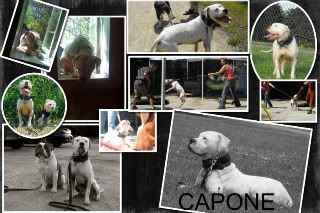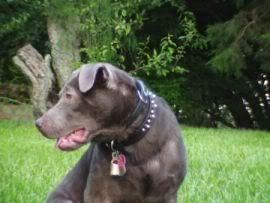 Eating wasps
#197434 - 06/04/2008 04:46 PM Eating wasps
#197434 - 06/04/2008 04:46 PM |
Webboard User
 
Reg: 03-21-2008
Posts: 91
Loc: Galilee, Israel
 Offline Offline |
|
Wasps just drive Darwin mad. He chases after them, pounces on them and then, yes, eats them. All the time - every one he sees. I don't know what it is about them, but I'm worried of course that he's going to get stung in the mouth, with all the dangers associated with that. I've only seen him stung badly once, on his paw. He sat licking his paw for a quarter of an hour and looking miserable, but that still didn't stop him chasing wasps, even while he was still recovering! He also got a small swelling on his cheek which I assume was a sting because it went down within a few hours. But if being stung doesn't seem to discourage him, what can we do? He gets so full of drive that he doesn't even notice the corrections. This is all inside the house, BTW.
I know I keep posting these crazy questions - is Darwin just weird? Anyway, what can we do?

research.haifa.ac.il/~leon/html/Arik_Page.htm |
 Top Top
|
 Re: Eating wasps
[Re: Arik Kershenbaum ]
#197437 - 06/04/2008 05:08 PM Re: Eating wasps
[Re: Arik Kershenbaum ]
#197437 - 06/04/2008 05:08 PM |
Webboard User
  
Reg: 08-05-2007
Posts: 323
Loc: Lake City, Coeur d' Alene, ID
 Offline Offline |
|
Shalom Arik - There was another post recently on this same subject. I recall that one was about bees.
I had a GSD that was quite adept at killing bees or wasps without getting stung. He would snap at them and shake his head immediately before he got stung. He wounded his enemy little by little, shaking his head every time, until it was dead.
Don't worry about crazy questions.
Lee Sternberg |
 Top Top
|
 Re: Eating wasps
[Re: lee sternberg ]
#197438 - 06/04/2008 05:13 PM Re: Eating wasps
[Re: lee sternberg ]
#197438 - 06/04/2008 05:13 PM |
Webboard User
 
Reg: 11-23-2007
Posts: 947
Loc: Cold-ville, Wisconsin.
 Offline Offline |
|
capone's favorite pass time while tied out in the yard is catching bees.....
can't get that dog to work a springpole to save my live, but he'll leap for those bees...
he too has not gotten stung.
pending your dog being allergic.....let him get stung, he'll stop then.
or, he'll get really good at it, and never get stung.
|
 Top Top
|
 Re: Eating wasps
[Re: Mallory Kwiatkowski ]
#197481 - 06/04/2008 10:00 PM Re: Eating wasps
[Re: Mallory Kwiatkowski ]
#197481 - 06/04/2008 10:00 PM |
Webboard User

  
Reg: 03-11-2008
Posts: 703
Loc: VA
 Offline Offline |
|
Just keep an eye on him when he's doing it. If he developes an allergic reaction you will know quickly. How many times has he been stung? The first time the exposure occurs, there is no reaction, it's the second or third time. (BOdy has to develop the allergy) If he's been stung a few times, I wouldn't worry so much. My Boxer is allergic to fire ants, but she finds them anyway. I put repellent down and kill every mound i find, but the buggers always come back and darned if that dog doesn't find them before I do! Have some regular benedryl or something like that on hand just in case.
I love your questions! They are always great!
When a flower doesn't bloom, you fix the environment in which it grows, not the flower. |
 Top Top
|
 Re: Eating wasps
[Re: Cameron Feathers ]
#197506 - 06/05/2008 02:23 AM Re: Eating wasps
[Re: Cameron Feathers ]
#197506 - 06/05/2008 02:23 AM |
Webboard User
 
Reg: 04-29-2008
Posts: 207
Loc:
 Offline Offline |
|
Ditto Molly. She's learned to kill them without getting stung too or at least I haven't seen her get stung and no swelling noticed.
If the dog isn't allergic however there shouldn't be much problem. In fact getting stung multiple times, if no allergy is present, will build up an immunity to bee stings. I know because I used to raise bees and over the years I've built up immunity to the swelling. Still hurts though.
|
 Top Top
|
 Re: Eating wasps
[Re: Arik Kershenbaum ]
#197508 - 06/05/2008 04:10 AM Re: Eating wasps
[Re: Arik Kershenbaum ]
#197508 - 06/05/2008 04:10 AM |
Webboard User

  
Reg: 08-06-2005
Posts: 615
Loc: San Diego, CA
 Offline Offline |
|
. . . This is all inside the house, BTW. . .
Now that part got me. 
My GSD loves to catch and eat bees, too. She got a minor sting in her mouth once, but it didn't slow her down.
I'd just be careful the dog didn't go after or disturb the nest like this! You might Google bee stings/wasp stings and get some tips on how to make the inside/outside of your house less attractive to them.
Mike
Suppose you were an idiot.
Suppose you were a member of Congress.
But I repeat myself.
-Mark Twain |
 Top Top
|
 Re: Eating wasps
[Re: Mike Armstrong ]
#197541 - 06/05/2008 12:09 PM Re: Eating wasps
[Re: Mike Armstrong ]
#197541 - 06/05/2008 12:09 PM |
Webboard User

  
Reg: 10-24-2005
Posts: 749
Loc: Tucson, Az
 Offline Offline |
|
I have seen my dogs trying to kill flies, bees, and wasps too only if they were bothering them. I like bees and don't want to see their population decline because they are excellent pollinators. Without them, no more pretty flowers and honey. 
"It's better to be an optimist who is sometimes wrong than a pessimist who is always right" |
 Top Top
|
 Re: Eating wasps
[Re: Lindsay Janes ]
#197542 - 06/05/2008 12:16 PM Re: Eating wasps
[Re: Lindsay Janes ]
#197542 - 06/05/2008 12:16 PM |
Webboard User

   
Reg: 04-30-2005
Posts: 2784
Loc: Toronto, ON
 Offline Offline |
|
Are bees on the endangered species list??
|
 Top Top
|
 Re: Eating wasps
[Re: Mike J Schoonbrood ]
#197547 - 06/05/2008 12:41 PM Re: Eating wasps
[Re: Mike J Schoonbrood ]
#197547 - 06/05/2008 12:41 PM |
Webboard User

  
Reg: 09-22-2007
Posts: 2531
Loc: S. Florida
 Offline Offline |
|
|
 Top Top
|
 Re: Eating wasps
[Re: Lynne Barrows ]
#197564 - 06/05/2008 02:03 PM Re: Eating wasps
[Re: Lynne Barrows ]
#197564 - 06/05/2008 02:03 PM |
Webboard User
 
Reg: 04-29-2008
Posts: 207
Loc:
 Offline Offline |
|
Some info on bee stings and treatment if anyone is interested.
In case of bee stings, if possible try to identify what type of bee has stung. Wasps, hornets and bumblebees don't leave a stinger but can sting multiple times. With these just remove the dog or person from the area of the bees and/or remove the bee from the dog or person and kill it.
Honey bees however do leave their stinger behind along with a venom sack. They can sting only once and the bee dies after stinging. You can often see the venom sack on top of the stinger. It will be pulsing (injecting more venom). To reduce the amount of venom that gets injected during a honeybee sting try to find the stinger and scrape it out with a dull knife or credit card etc. Start scraping at the base of the stinger against the skin. Don't try to pull it out with your fingers. That squeezes the venom sack and injects more venom.
Watch for signs of allergic reaction such as excess panting (dogs) or sweating (humans), trouble breathing or severe swelling. If noticed contact a vet (dogs) or call 911 (humans).
The best pain medicine for bee stings. Most beekeepers use these. It also works on dogs if you can find the site of the sting. They provide almost instant relief from the pain.
http://www.sting-kill.com/
There are similar products you can get in most pharmacies but they don't have as much of the pain killing medicine Sting Kill brand has.
If you don't have access to pain medication you can mix water with some dirt and apply the mud to the sting area. This is a temporary measure so be sure to wash the sting site and use an antibacterial medication as soon as possible. If at home you can also dab a little ammonia onto the sting site.
Being chased by bees:
In most cases where a bee or multiple bees become agitated you can usually walk around a corner, tree, bush or through a door and the bee will leave. This doesn't work however with Africanized "killer" bees. If you suspect Africanized bees and/or live in the southern or southwestern United states in areas inhabited by Africanized honeybees try to get indoors or inside a car or anyplace behind a door. Africanized bees will stay agitated for a much longer time than regular honeybees and are more inclined to attack in mass.
Edited by Matt Wyrick (06/05/2008 02:04 PM)
Edit reason: Spelling
|
 Top Top
|
When purchasing any product from Leerburg Enterprises, Inc. it is understood
that any and all products sold by Leerburg Enterprises, Inc. are sold in Dunn
County Wisconsin, USA. Any and all legal action taken against Leerburg Enterprises,
Inc. concerning the purchase or use of these products must take place in Dunn
County, Wisconsin. If customers do not agree with this policy they should not
purchase Leerburg Ent. Inc. products.
Dog Training is never without risk of injury. Do not use any of the products
sold by Leerburg Enterprises, Inc. without consulting a local professional.
The training methods shown in the Leerburg Ent. Inc. DVD’s are meant
to be used with a local instructor or trainer. Leerburg Enterprises, Inc. cannot
be held responsible for accidents or injuries to humans and/or animals.
Copyright 2010 Leerburg® Enterprises, Inc. All rights reserved. All photos and content on leerburg.com are part of a registered copyright owned by Leerburg Enterprise, Inc.
By accessing any information within Leerburg.com, you agree to abide by the
Leerburg.com Privacy Policy and Terms of Use.
 Previous Topic
Previous Topic Index
Index Next Topic
Next Topic













 Top
Top







